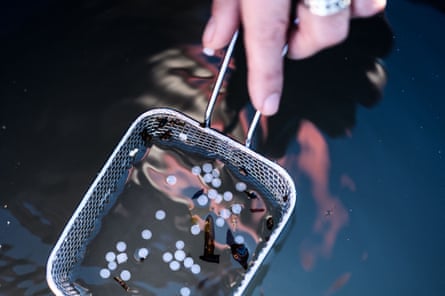The French government is taking legal action over an “environmental nightmare” caused by waves of tiny plastic beads washing up on the coast of Brittany.
The white pellets the size of grains of rice, “mermaids’ tears”, have appeared on beaches in France and Spain for the last year. They are believed to have come from shipping containers lost in the Atlantic Ocean.
Dozens of volunteers turned up at the weekend to sift through sand at Pornic on France’s north-west coast to collect the white beads, called industrial plastic granules (IPG), measuring less than 1.5mm. Environmental activists admit it is a hopeless task.
“It’s more symbolic than anything else: I don’t think we’re going to pick up the whole container,” said Annick, a retiree who had filled the bottom of a yoghurt pot with a few dozen pellets, to AFP.
Another local, Dominique, who turned out to help, added: “I wanted to pick them up but it’s endless. There are too many.”

Lionel Cheylus, spokesperson for the Surfrider Foundation Europe, the campaign group that organised the clean-up operation, told journalists: “These pellets are often lost [off the French coast] but I’ve never known it this bad.” Surfrider estimates that every year about 160,000 tonnes of the beads are lost in the EU and 230,000 tonnes are lost worldwide.
Jean-François Grandsart of Surfrider added: “The beads are so small that we can’t do anything about them. We can try to clean them up by hand, but it’s just a drop in the ocean.”. He said the plastic would eventually break down into nanoparticles and be ingested by fish, oysters and mussels, eventually ending up on people’s plates.
Jean-Michel Brard, the mayor of Pornic, told French journalists he had filed a legal complaint along with two other mayors from affected seaside resorts in the region. However, officials say it is impossible to identify the origin of the beads.
Christophe Béchu, the minister for ecological transition, said the pellets were an “environmental nightmare” and that the government would also be taking legal action “against x” [persons unknown].
“The state stands with the associations,” Béchu said.
The problem is not a recent one. In 2018, he Cornish Plastic Pollution Coalition raised the alarm about the impact of what it called “bio-bead pollution” to local waterways, beaches, seas and wildlife.

 1 year ago
69
1 year ago
69










 English (US)
English (US)